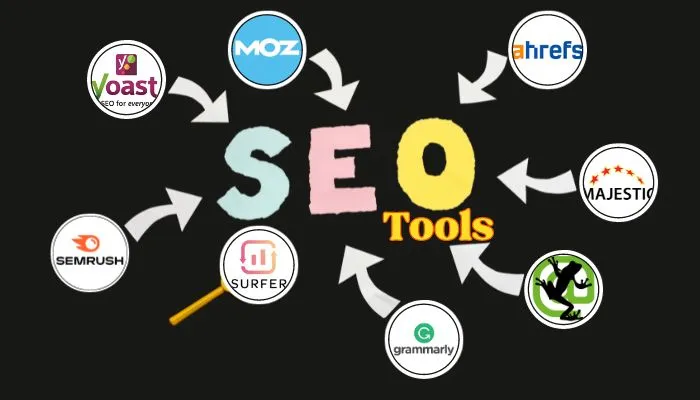
In the ever-dynamic digital marketing landscape, Search Engine Optimization (SEO) stands as an indispensable pillar for achieving online visibility and success. To excel in the art of SEO, it’s paramount to be well-acquainted with the latest and most potent SEO tools available. This article is dedicated to guiding beginners through SEO by presenting a comprehensive array of tools that every digital marketer should be well-versed in.
SEO involves a multitude of strategies and techniques aimed at optimizing your website to align with the ranking algorithms of prominent search engines, particularly Google. While the core principles of SEO remain steadfast, the tools designed to facilitate the execution of these strategies continue to evolve.
1. Keyword Research Tools
Google Keyword Planner: An apt point of embarkation for SEO novices, Google Keyword Planner offers insights into relevant keywords for your niche, complete with data on search volume, enabling you to identify terms resonating with your target audience.
SEMrush: SEMrush, a versatile tool, provides an in-depth keyword research experience. It furnishes data on both organic and paid search keywords and offers competitive analysis to guide your selection of the most effective keywords.
2. On-Page SEO Tools
Yoast SEO (for WordPress): If your website resides on the WordPress platform, Yoast SEO is an indispensable plugin. It assists in optimizing content, encompassing meta titles, meta descriptions, and readability, ensuring that your content aligns with both user expectations and search engine standards.
Moz On-Page Grader: For those seeking to improve their on-page SEO, Moz’s On-Page Grader is a valuable resource. It evaluates individual pages on your website and furnishes recommendations for optimization.
3. Link Building Tools
Ahrefs: Ahrefs, renowned for its link-building capabilities, offers a comprehensive suite of tools. It aids in the exploration of backlinks, competitor analysis, and the identification of link-building opportunities. Its user-friendly interface and extensive data are particularly accommodating for beginners.
Majestic: Majestic is another noteworthy link-building tool. It provides tools for backlink analysis, tracking website trust flow, citation flow, and understanding the broader context of your site’s backlink profile.
4. Technical SEO Tools
Google Search Console: A beginner-friendly tool, Google Search Console is instrumental for monitoring and managing your website’s presence in Google’s search results. It offers insights into how Google crawls and indexes your site.
Screaming Frog: Screaming Frog is a comprehensive website crawler, designed to audit the technical aspects of your website. It is invaluable for identifying issues such as broken links, duplicate content, and other SEO-related challenges.
5. Analytics Tools
Google Analytics: Google Analytics is an essential tool for tracking website performance. It offers valuable data on website traffic, user behaviour, and conversion rates. Beginners can initiate their journey with the fundamental features and progressively delve into more advanced aspects.
SEMrush (again): SEMrush, renowned for its keyword research capabilities, also provides in-depth website analytics. It is a comprehensive tool for tracking website performance and gaining insights into your competitors.
6. Content Optimization Tools
SurferSEO: SurferSEO specializes in optimizing content for SEO. It analyzes top-ranking pages for specific keywords and offers actionable suggestions to enhance the ranking potential of your content.
Grammarly: While not an SEO tool in the traditional sense, Grammarly contributes to error-free and well-crafted content. This indirectly influences SEO, as high-quality, error-free content often ranks better.
7. Mobile Optimization Tools
Google’s Mobile-Friendly Test: With the increasing importance of mobile optimisation, Google’s Mobile-Friendly Test helps evaluate your website’s performance on mobile devices and offers recommendations for enhancement.
PageSpeed Insights: Google’s PageSpeed Insights tool is instrumental in assessing your website’s loading speed on both desktop and mobile. Faster-loading websites typically enjoy higher search engine rankings.
8. Local SEO Tools
Google My Business: For businesses with a physical presence, Google My Business is an essential tool. It allows for the management of your online presence on Google, encompassing local search results, reviews, and business information.
BrightLocal: BrightLocal is tailored for local SEO, offering features such as local rank tracking, citation building, and review management. It is particularly valuable for businesses targeting local markets.
In Conclusion
SEO is an ever-evolving discipline, and it’s vital to remain abreast of the latest tools and techniques. As a beginner, mastering SEO begins with an understanding of these fundamental tools. Nevertheless, continuous learning and adaptation are pivotal, as SEO is an ongoing journey. With the right tools and a commitment to staying informed, you can enhance your website’s visibility, drive organic traffic, and succeed in the dynamic digital landscape. Remember that SEO is an evolving field, and continual education and awareness of emerging trends are pivotal to long-term success.
Recent Posts
Categories
Our Address:
2nd Floor, H-187, Block – H, Sector 63, Noida, Uttar Pradesh 201301, India
Phone: +91-8882811078
Email: hello@digidiracademy.com
©2025. DigiDir Academy, Digital Marketing Training in Noida. All Rights Reserved.
You can see how this popup was set up in our step-by-step guide: https://wppopupmaker.com/guides/auto-opening-announcement-popups/